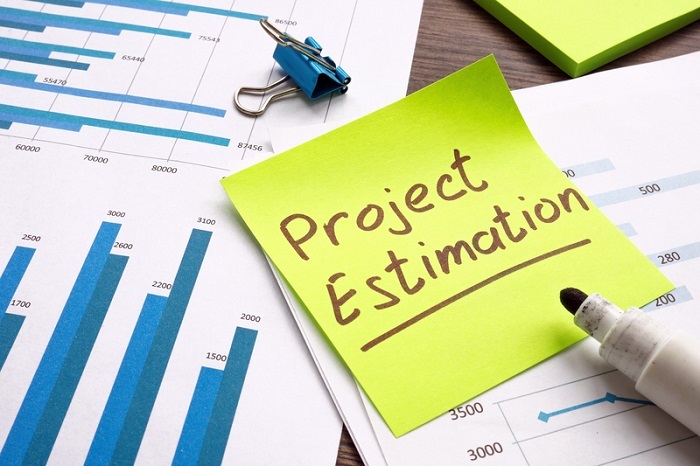
 Data Structure
Data Structure Networking
Networking RDBMS
RDBMS Operating System
Operating System Java
Java MS Excel
MS Excel iOS
iOS HTML
HTML CSS
CSS Android
Android Python
Python C Programming
C Programming C++
C++ C#
C# MongoDB
MongoDB MySQL
MySQL Javascript
Javascript PHP
PHP
- Selected Reading
- UPSC IAS Exams Notes
- Developer's Best Practices
- Questions and Answers
- Effective Resume Writing
- HR Interview Questions
- Computer Glossary
- Who is Who
Project Estimation: How Accurate is Your Project Estimation?
Project estimation is a crucial point of project management that involves the prediction of the time, effort, and resources required to complete the project successfully. Through accurate project estimation, project managers are able to effectively and efficiently plan, organize, and execute their projects. It also helps in stakeholder management Additionally it helps project managers in understanding the stakeholder's expectations, ensuring project completion within budget, and also identify potential risks and issues. However, the complexity of project estimation requires the project manager to consider multiple factors.

What Are the Steps in Project Estimation?
Generally, the steps involved in project estimation are as follows ?
Define the scope of the project ? By identifying the deliverables, objectives, and requirements of the project, the scope of the project is defined during the first step of project estimation.
Break down the project into tasks ? The next step in the process is to break the scope into smaller and more manageable tasks that help to identify the individual activities required to complete the project.
Estimate the effort required for each task ? The next step is to estimate the effort required to complete each task by considering the complexity of the task, the skills required, and the experience of the team members who will be working on it.
Determine dependencies between tasks ? After the estimation, the dependencies between tasks are identified as it is crucial to ensure that the tasks are completed in the correct order and that the project stays on schedule.
Determine the resources required ? The next step is to identify the resources required, such as equipment, software, and personnel required for each task.
Determine the timeline ? Following the above steps, a critical path is identified based on the estimated effort, dependencies, and resources required. This ensures that the project is completed on time.
Review and revise the estimate ? The final step is the review and revision of the estimates which is done on a regular base throughout the project. This helps the project estimation to remain accurate and up-to-date and identify any potential issues or delays.
How Can You Measure the Accuracy of the Project Estimation?
Any estimation within the project can be ineffectual if the accuracy is anything less than the maximum achievable hence it is critical for project managers to ensure that their projects are completed successfully within budget and on time. Accuracy in project estimation helps in avoiding cost overruns, delays, and unsatisfied stakeholders. The accuracy of project estimation is influenced by various factors that can be measured in different ways such as ?
Actual vs. Estimated Cost ? By comparing the actual cost of the project with the estimated cost to evaluate the accuracy of the initial estimation, the cost can be used to measure the accuracy of project estimation.
Actual vs. Estimated Time ? By comparing the actual time taken to complete the project with the estimated time, the project manager is able to measure the accuracy where the closer the actual time is to the estimated time, the more accurate the estimation.
Expert Opinion ? One of the key qualities a project manager should possess is the willingness and right attitude toward seeking guidance and feedback. When it comes to estimation, the project manager can seek feedback from experts in the field to evaluate the accuracy of their estimations.
Variance Analysis ? Variance analysis is a technique used to compare the actual performance of a project with the planned performance. In this technique, the actual results with the planned results are compared.
Historical Data ? By using historical data from previous projects, project managers are able to evaluate the accuracy of their estimations by comparing the actual results of the previous project with the initial estimates. The results also indicate the overestimation and underestimation tendencies in decision-making.
What Are the Common Mistakes That Could Affect the Accuracy of Project Estimation?
A few of the common mistakes that could influence the accuracy of estimation are as follows ?
Underestimating the effort required ? Underestimation of the amount of effort required to complete a task is a commonly committed mistake in project estimation. This could be due to the lack of familiarity with the task and could lead to unrealistic timelines and delays in the project.
Failing to consider dependencies ? Failure or incorrect analysis of dependencies between tasks leads to delays and increased effort.
Overestimating the resources available ? Overestimation of the resources available also leads to unrealistic expectations and a lack of resources when they are needed which in turn creates further delays in procurement.
Failing to consider risks ? Failing to consider risks due to ignorance or lack of knowledge gives way to unexpected events or changes in scope which further lead to delays and increased effort.
Not involving the right stakeholders ? Improper identification of stakeholders or not using the stakeholder matrix leads to not involving the right stakeholders, such as team members or clients, and causes inaccurate estimates and unrealistic expectations.
Relying on historical data without considering changes ? While considering historical data is useful and important, it is also crucial that the estimation is aligned with the new technologies or changes in team members that could influence the estimates.
Not revising the estimate ? Failing to revise the estimate regularly can lead to outdated information and inaccurate timelines.
Conclusion
Project estimation is a critical aspect of project management, it requires careful planning and multiple factors are to be considered in order to manage stakeholder expectations, identify potential risks and issues, and achieve project success. By comparing the actual results with the estimated results, using factors like variance analysis, historical data, and expert opinions, project managers are able to identify areas where they need to improve their estimation process. Through Accurate estimations, project managers are able to avoid cost overruns, delays, and unsatisfied stakeholders, which is essential for the success of any project. To avoid any mistakes that could cause inaccuracy in the estimation, it is important to involve the right stakeholders, consider all relevant factors, and revise the estimate regularly throughout the project this in turn will help to ensure that the projects are completed successfully and within budget.

